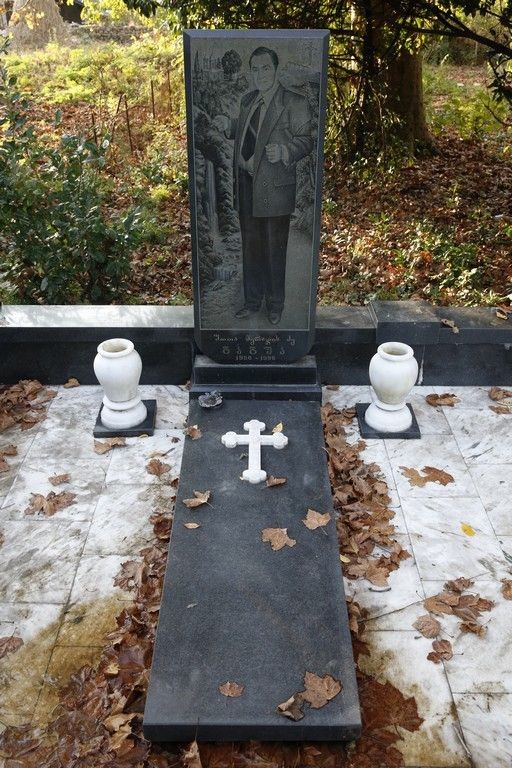Once you’re dead, you won’t have the eyes and brain it takes to see and comprehend stuff. So it’s understandable if you don’t really give a shit about what your headstone looks like.Nevertheless, the guy whose grave the photographer Sergey Stroitelev came across on a recent trip to Georgia—complete with a marble statue of himself—obviously did. It was the final resting place of someone whom people in post-Soviet countries call a “thief in law”—a person with significant authority in criminal circles, a.k.a. a mafia boss.
Advertisement
Sergey's next few days in Georgia were spent in the town of Kutaisi—or "the motherland of Georgian thieves in law,” as he calls it—photographing a bunch of flamboyantly embellished graves. I called him up for a chat.VICE: Hi, Sergey. How did you end up taking pictures of graves?
Sergey Stroitelev: I traveled to Georgia last November, more as a tourist than as a photographer. I didn't plan on this project, but I was riding in a taxi one day, looked out of the window, and saw this big grave. A portrait of a man holding a cigarette was painted on the headstone, and a big star was set in front of it—and everyone in Russia knows that the star means someone was incredibly influential in the criminal world. The taxi driver told me about this city in central Georgia called Kutaisi. Apparently, the cemeteries there were filled with these graves, so I thought I'd check it out. Can you tell me about the stars?
A star with eight points symbolizes an important criminal. These guys usually get them tattooed on their hands or knees or shoulders. How long did you spend in Kutaisi?
About ten days. There was a lot of cemeteries to cover—about five or six. There's a lot of killings in the area. This town was the motherland of thieves in law—there were wars and feuds between the different clans.
Sergey Stroitelev: I traveled to Georgia last November, more as a tourist than as a photographer. I didn't plan on this project, but I was riding in a taxi one day, looked out of the window, and saw this big grave. A portrait of a man holding a cigarette was painted on the headstone, and a big star was set in front of it—and everyone in Russia knows that the star means someone was incredibly influential in the criminal world. The taxi driver told me about this city in central Georgia called Kutaisi. Apparently, the cemeteries there were filled with these graves, so I thought I'd check it out. Can you tell me about the stars?
A star with eight points symbolizes an important criminal. These guys usually get them tattooed on their hands or knees or shoulders. How long did you spend in Kutaisi?
About ten days. There was a lot of cemeteries to cover—about five or six. There's a lot of killings in the area. This town was the motherland of thieves in law—there were wars and feuds between the different clans.

Most of these graves are pretty lavish.
Yes, some of them were pretty expensive—and quite eccentric, too, in an abstract way. I consider this project abstract. I don’t take it too seriously, because, in my opinion, it’s a really absurd phenomenon for people who systematically break the law to have such monuments built in their honor, while people from honest or creative professions—like artists, painters, and cleaners—are buried under simple headstones. Maybe in a perverse way they were viewed as benefactors of their town, like Escobar for the poor of Medellín?
Yes, there was no powerful state system in Georgia until recently, so people couldn’t get help from the government or the ministers. If someone's neighbor was annoying, or if they needed money, they would turn to these thieves for advice and cash. It's very difficult to imagine that kids grew up wanting to be thieves. Maybe not in the cities, but definitely in the small towns, where the government played a small role. Do you have a favorite grave?
My favorite would probably be the one with the statue of the guy sitting on a large chair, holding a real cigarette. He was a pretty influential guy, and—if I remember correctly—he was shot.
Yes, some of them were pretty expensive—and quite eccentric, too, in an abstract way. I consider this project abstract. I don’t take it too seriously, because, in my opinion, it’s a really absurd phenomenon for people who systematically break the law to have such monuments built in their honor, while people from honest or creative professions—like artists, painters, and cleaners—are buried under simple headstones. Maybe in a perverse way they were viewed as benefactors of their town, like Escobar for the poor of Medellín?
Yes, there was no powerful state system in Georgia until recently, so people couldn’t get help from the government or the ministers. If someone's neighbor was annoying, or if they needed money, they would turn to these thieves for advice and cash. It's very difficult to imagine that kids grew up wanting to be thieves. Maybe not in the cities, but definitely in the small towns, where the government played a small role. Do you have a favorite grave?
My favorite would probably be the one with the statue of the guy sitting on a large chair, holding a real cigarette. He was a pretty influential guy, and—if I remember correctly—he was shot.
Advertisement

A lot of them have cigarettes in their hands.
The vast majority of the thieves were heavy smokers, and a lot of them died from heart attacks. I think cigarettes are part of their image—the same with beads. There are also a few women in there, right?
The funny thing is that some of these women are still alive, but they'll be buried there because they love their husbands so much.
The vast majority of the thieves were heavy smokers, and a lot of them died from heart attacks. I think cigarettes are part of their image—the same with beads. There are also a few women in there, right?
The funny thing is that some of these women are still alive, but they'll be buried there because they love their husbands so much.

And what's with the tables?
I think those are the most interesting thing about the cemeteries. The tables are there so that friends and relatives who visit can sit, smoke, or drink and talk to the person buried there. I saw quite a few people doing that, but I couldn't take any pictures because it seemed a little risky—some of these people were surely still connected to the criminal world. Did you have any problems with the locals while shooting?
Loads. Sometimes taxi drivers refused to take me to the cemeteries, and some people kept asking me if I was an agent. The same thing happened with the cemeteries' guards and management staff. A couple of times, people asked, "What are thieves in law? We don't know what you're talking about." And when I asked for directions, some would refuse to help me. What this means is that people are still afraid. Some may still be connected to the criminal world; others are just ashamed that their hometown has a bad reputation. I think there are still thieves in law in Kutaisi. The last grave was dated 2013. I was taking pictures one day in a restaurant during a big Georgian party. This guy called me over and said, "Do you know who I am? I am a thief, and I can kill you for taking photos of me." He put his finger to my head, simulating a gun. When I went back to my hostel, the owner said the guy was just joking, but I'm not too sure about that.
I think those are the most interesting thing about the cemeteries. The tables are there so that friends and relatives who visit can sit, smoke, or drink and talk to the person buried there. I saw quite a few people doing that, but I couldn't take any pictures because it seemed a little risky—some of these people were surely still connected to the criminal world. Did you have any problems with the locals while shooting?
Loads. Sometimes taxi drivers refused to take me to the cemeteries, and some people kept asking me if I was an agent. The same thing happened with the cemeteries' guards and management staff. A couple of times, people asked, "What are thieves in law? We don't know what you're talking about." And when I asked for directions, some would refuse to help me. What this means is that people are still afraid. Some may still be connected to the criminal world; others are just ashamed that their hometown has a bad reputation. I think there are still thieves in law in Kutaisi. The last grave was dated 2013. I was taking pictures one day in a restaurant during a big Georgian party. This guy called me over and said, "Do you know who I am? I am a thief, and I can kill you for taking photos of me." He put his finger to my head, simulating a gun. When I went back to my hostel, the owner said the guy was just joking, but I'm not too sure about that.
Advertisement

